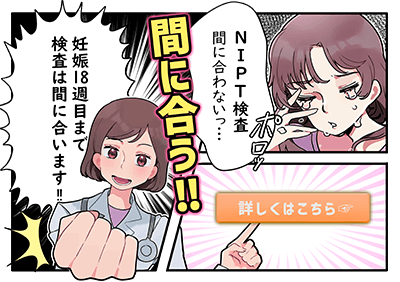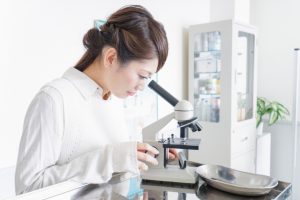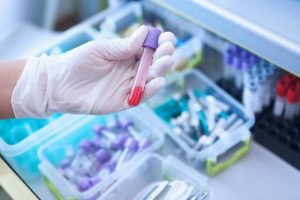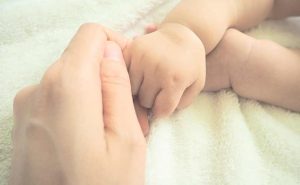Receive expert guidance on navigating a positive NIPT result at Hiro Clinic. Our doctor-supervised support provides insights on what to do next, ensuring you are informed and supported throughout the process.
- NIPT test results
- If the NIPT test result is positive, get a confirmatory test
- Schedule your test with a positive result in mind
- What if the NIPT results from the Hiro Clinic NIPT are positive?
- If you want to have NIPT, go to a facility with excellent follow-up care
NIPT test results
NIPT is determined by comparing the number of genetic information from fragments of the baby’s DNA taken from the mother’s blood with a cut-off value that determines whether the chromosomes are normal or abnormal.
NIPT is a screening test to determine the likelihood of a ‘high’ or ‘low’ risk of disease. NIPT is a very effective test as a criterion before a definitive diagnosis of ‘yes’ or ‘no’ chromosomal abnormality is made.

What is positive?
If the value of the test result is outside the reference range, the result is considered to be ‘positive’ and may indicate a possible chromosomal disease.
What is negative?
If the value of the test result is within the reference range, the result is considered ‘negative’ and there is a low probability of chromosomal disease.
What is re-inspection (withholding judgment)?
A ‘retest (decision withheld)’ may occur for reasons such as ‘the amount of the baby’s DNA in the sample (blood taken) was lower than the standard’ or ‘the test could not be carried out due to medication being taken’.
If the NIPT test result is positive, get a confirmatory test
As mentioned above, NIPT is only a screening test and not a test to diagnose whether the foetus has abnormalities in its chromosomes itself. Therefore, even if a baby is diagnosed positive by NIPT, there is a possibility of ‘false positives’, where the baby is negative but is diagnosed positive for a variety of reasons.
It is therefore recommended to undergo definitive tests such as ‘amniotic fluid test’ or ‘chorionic villus test’ to confirm whether the baby really has a chromosomal disease.
What is amniotic fluid testing?
Amniotic fluid test is a ‘test of the chromosomes themselves in the amniotic fluid’. A thin needle is inserted into the mother’s abdomen and the amniotic fluid is taken directly. The amniotic fluid contains an abundance of the baby’s chromosomes, which are analysed to determine the presence of abnormalities in the baby’s chromosomes and genes, and to confirm whether a genetic disorder is present, in order to make a definitive diagnosis.
The appropriate period for amniotic fluid testing is between the 15th and 18th week of pregnancy, when the amniotic fluid is increasing.
What is chorionic villus testing?
Chorionic villus test is a test for genetic abnormalities by obtaining cells from the trophoblasts of foetal origin. It can be performed as early as 10-13 weeks’ gestation, but as the cells are derived from the placenta and not completely from the foetus, it is now considered to be a rarely performed test.
Also, as the foetus and placenta may carry different genes, an amniotic fluid test is considered appropriate for an accurate and definitive diagnosis.
Schedule your test with a positive result in mind
NIPT is available from 10 weeks 0 days, but is by appointment only at most testing facilities. Therefore, if you want to have a NIPT as soon as you are 10 weeks pregnant, it is advisable to make an appointment with the laboratory before that (by 9 weeks’ gestation).
If the NIPT result is found to be positive and you wish to have an amniotic fluid test as a definitive test, the test can be done from 15 weeks’ gestation, but it takes about three to four weeks before the results are known, as the cells are cultured for determination. Therefore, if an amniotic fluid test is taken at 15 weeks’ gestation, a confirmed diagnosis is not likely to be made until around 18-19 weeks’ gestation.
The later you undergo NIPT, the less time you have to prepare for a definitive diagnosis, so it is important to schedule your NIPT with the possibility of undergoing an amniotic fluid test in mind.
【Sample schedule】
| 8-9 weeks’ gestation | 2/1 (8 weeks 0 days) | NIPT test appointments |
|---|---|---|
| From 10 weeks 0 days of gestation | 2/15 (10 weeks 0 days) | NIPT test conducted |
| 10-11 weeks’ gestation | 2/18 (10 weeks 3 days)~ | Receive NIPT test results → if positive, consider and book an amniocentesis test |
| 15 weeks’ gestation | 3/22 (15 weeks 0 days) | If NIPT positive: amniotic fluid test conducted |
| 18-19 weeks’ gestation | 4/12 (18 weeks 0 days)~ | Receipt of amniotic fluid test results (approx.) |

What if the NIPT results from the Hiro Clinic NIPT are positive?
Excellent post-inspection follow-up for peace of mind
At Hiro Clinic NIPT, if you have a positive NIPT test result, our team of gynaecologists, paediatricians, clinical geneticists and genetic technicians will support you after the test.
In addition, if a re-test (decision pending) is required, you can rest assured that you will receive detailed explanations on how to proceed with the test in the future.

After the examination, you can apply for a consultation with a specialist
Hiro Clinic NIPT is staffed by specialists from the Japan Society of Obstetrics and Gynaecology, prenatal consulting paediatricians and clinical genetic specialists, who are available for consultations on the day of the NIPT test. If you wish to have a consultation after the NIPT test, a doctor on the staff team is available for consultation and genetic counselling. Please call us if you would like to book this service. Depending on the schedule of the doctor in charge, appointments can be made.
Excellent follow-up on amniotic fluid testing costs
Amniotic fluid testing, like NIPT, is not covered by insurance and is an unregulated procedure. The cost varies from laboratory to laboratory, but the average cost of amniotic fluid testing for the 111 cases supported by Hiro Clinic NIPT is JPY 162,272, which is a very large financial burden if you decide to have an amniotic fluid test after NIPT.
Hiro Clinic NIPT offers an amniotic fluid test support system to help with the cost of an amniotic fluid test so that women do not have to give up on having a definitive test because of the cost burden.
Amniotic fluid testing support for peace of mind
Hiro Clinic NIPT offers amniotic fluid testing support organised by partner laboratories. The fee is JPY 3,000 (excluding tax). By using the amniotic fluid test support, you can receive a subsidy of up to 200,000 yen (including tax) for the cost of an amniotic fluid test if the test result is positive.
To avoid problems if the NIPT test result is positive, you can enrol in the amniotic fluid test support service when you apply for the NIPT test.
There is also a very low chance that the NIPT may be retested twice in a row, resulting in an ‘inconclusive’ result. Pregnant women who wish to have an amnio test in such cases can also use the amnio test support to receive assistance with the cost of the amnio test.。
※For more information on the reasons why a determination is not possible, please click here.
Information on medical centres where amniotic fluid testing is available
Hiro Clinic NIPT will guide you to the medical centres that offer amniotic fluid testing. Regardless of which medical institution you have your amniotic fluid tested at, you are covered by the amniotic fluid testing support. Of course, amniotic fluid testing at your family doctor is also covered by the amniotic fluid testing support if you are enrolled in the programme, but some people may think that they do not want their doctor to know. In that case, Hiro Clinic NIPT will support you.
NIPT test analysis data can be compared with amniotic fluid test results
Data (positive scores) analysed from the results of over 60,000 NIPT tests performed by Hiro Clinic NIPT to date can be compared and discussed with the results of amniotic fluid tests.
If you want to have NIPT, go to a facility with excellent follow-up care
NIPT has its own characteristics depending on the medical institution performing the test. When choosing a medical institution, it is important not only to compare prices, but also to gather information on the contents of the test and the follow-up services provided. It is also important to set a schedule that takes into account the possibility of receiving a definitive diagnosis. Find out about the health of the foetus as early as possible and have a healthy pregnancy and delivery.
At Hiro Clinic NIPT, specialists from the Japan Society of Obstetrics and Gynaecology, prenatal consultant paediatricians, clinical geneticists and genetic technicians are on staff to provide post-test consultations and genetic counselling, and we also offer a subsidy system for expensive amniotic fluid tests. If the NIPT result is positive, we will support pregnant women with excellent follow-up services.
Summary of follow-up after Hiro Clinic NIPT testing
The follow-up arrangements for Hiro Clinic NIPT are summarised below. If you would like to make an appointment, please call us and make an appointment.
| Medical examination on non-inspection days | Direct or remote 20 mins | JPY 4,000 (JPY 4,400 incl. tax) |
|---|---|---|
| Examination by a clinical geneticist | Remote 20 mins | JPY 4,000 (JPY 4,400 incl. tax) |
| Amniotic fluid testing support (follow-up on amniotic fluid testing costs) |
One-time payment only | JPY 3,000 (JPY 3,000 incl. tax) |
※The following criteria are used to subsidise the cost of amniocentesis.
- If aneuploidy of chromosomes 1-22 or sex chromosomes (all chromosomes) is positive, assistance is provided for the G-band test and qf-PCR assay.
- If the whole autosomal whole-region partial deletion disease is positive, assistance is provided for G-band, qf-PCR and microarray methods.
- Subsidies are provided for cases where the Hiro Clinic NIPT is still inconclusive after two tests.
※Amniotic fluid testing support is not available if a stand-alone chromosome plan is selected.
Q&A
-
QIf I test positive for NIPT, what should I do next?Amniocentesis and chorionic villus examination are recommended to make a definitive diagnosis.
-
QHow accurate are positive NIPT results?The sensitivity and specificity of NIPT is very high at 99.9%, but it is not a definitive diagnosis and false positives are possible.
-
QIf NIPT is positive, is there a chance that the baby is healthy?Yes, NIPT is a screening test and a definitive diagnosis may confirm that the patient is healthy.
-
QWhat are the reasons for a positive NIPT result?A chromosomal abnormality is considered positive if it is detected in a DNA fragment of fetal origin.
-
QWhat is the timeline for a positive NIPT result?Amniotic fluid testing is available after the 16th week of pregnancy and takes 3-4 weeks to get the results. It is important to schedule early.
-
QIs amniotic fluid testing mandatory after a positive NIPT?If a definitive diagnosis is desired, amniotic fluid testing is considered the most reliable method.
-
QShould I seek genetic counseling if I have a positive NIPT?Yes, professional genetic counseling can help you learn more about the implications of your results and your future options.
-
QHow likely is a positive NIPT result to be misinterpreted?The false positive rate is very low, but depends on the disease or condition and requires a definitive diagnosis.
-
QIs there financial support available for a positive NIPT?Some medical institutions may offer subsidies to cover the cost of amniotic fluid testing.
-
QHow should I discuss with my family whether or not to accept a positive NIPT result?It is recommended that the family share the results and discuss options carefully through consultations with specialists and counselors.
-
QWhen will I be notified of my positive NIPT result?It is common to be notified within one to two weeks of the inspection.
-
QIf I test positive for NIPT, should I consider abortion?Abortion is a choice made by the pregnant woman herself, and it is important to decide carefully in consultation with a specialist.
-
QWhat are the key factors in choosing a testing facility for a positive NIPT?It is important to choose a facility that offers excellent post-test follow-up and genetic counseling.
-
QIf I test positive for NIPT, should I be retested?A decision may need to be withheld or retested.Please follow the instructions of your healthcare provider.
-
QCan a positive NIPT result be misinterpreted as negative?False positives and conversely false negatives are also rare and require a definitive diagnosis.
-
QHow do I deal with the psychological burden of a positive NIPT result?Use medical support and genetic counseling, and consult with family members and specialists.
-
QHow often do NIPT-positive results turn out to be negative for a definitive diagnosis?The specific percentage depends on the disease, but false positives may be confirmed.
-
QWhat are the reasons when a positive NIPT result does not match a positive result in a definitive diagnosis?The determination may differ due to a mixture of fetal and maternal DNA or technical factors.
-
QShould I opt for a chorionic villus test after a positive NIPT?Chorionic villus examination is a definitive diagnosis that can be performed around 10 to 13 weeks of pregnancy, but should be discussed with a physician because of the risks involved.
-
QIf NIPT positive, should I consider genetic effects on other family members?If a specific genetic disorder is suspected, it is advisable to consult a specialist regarding family history and future implications.
Receive expert guidance on navigating a positive NIPT result at Hiro Clinic. Our doctor-supervised support provides insights on what to do next, ensuring you are informed and supported throughout the process.
Article Editorial Supervisor

Dr Hiroshi Oka
NIPT specialist clinic, MD
Graduated from Keio University, School of Medicine
 中文
中文
























